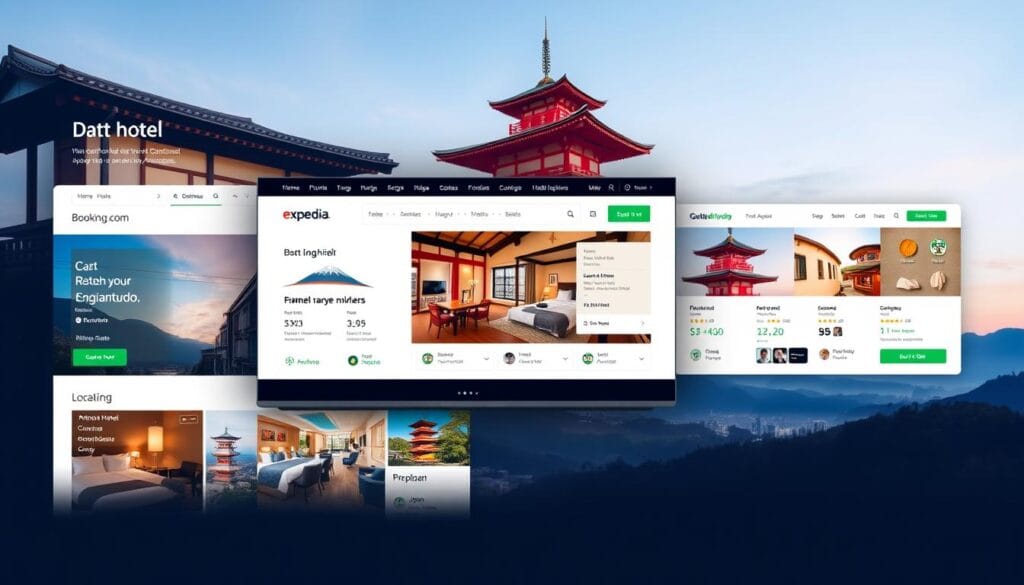Imagine stepping off the plane in Tokyo, to search for the best hotels to book in Japan.your suitcase rolling behind you as cherry blossoms drift through the air. The thrill of exploring ancient temples, neon-lit streets, and serene onsens awaits—but where you rest each night shapes your entire journey. Choosing the right accommodation isn’t just about a place to sleep; it’s about curating memories that linger long after you return home.
Japan offers everything from sleek high-rise suites overlooking Mount Fuji to centuries-old ryokans with tatami floors. Yet navigating the sea of options can feel overwhelming. Should you prioritize proximity to Shibuya’s scramble crossing or a quiet retreat in Kyoto’s bamboo groves? What platforms offer exclusive deals or English-language support for reservations?
This guide simplifies your search. We’ll explore trusted global platforms like Agoda and local favorites such as Rakuten Travel, which specialize in authentic stays. Discover how filtering by amenities—like free breakfast or hot-spring access—can elevate your trip. Learn why comparing prices across multiple websites ensures you secure the ideal room, whether you’re eyeing a $29/night guesthouse or a luxury suite at the Mandarin Oriental.
Key Takeaways
- Japan’s accommodations range from modern high-rises to traditional ryokans, catering to every travel style.
- Trusted platforms like Rakuten Travel specialize in local options rarely found on global sites.
- Filtering by amenities (free Wi-Fi, cancellation policies) tailors your stay to personal needs.
- Comparing prices across multiple websites often reveals hidden deals and seasonal discounts.
- Guest reviews on platforms like KAYAK provide real-world insights into property quality and location.
Introduction to Hotel Booking in Japan
Japan’s lodging landscape dances between neon-lit skyscrapers and paper-screen inns, where futuristic capsules share streets with 300-year-old ryokans. This duality means your choice of accommodation becomes part of your cultural immersion—not just a place to recharge.
Understanding Japan’s Unique Accommodation Scene
You’ll find more than standard rooms here. Capsule pods near Shinjuku Station offer budget stays from $30/night, while Kyoto’s family-run minshuku provide tatami mats and home-cooked meals. Business hotels cluster near JR stations, perfect for dawn departures to Hiroshima. Traditional ryokans might charge $350+ but include kaiseki dinners and private onsens.
Local platforms like Rakuten Travel list properties rarely seen globally—think temple lodgings or farmhouse stays. Yet English-language websites often miss 40% of options available on Japanese versions. This gap makes understanding platform strengths crucial.
The Importance of Choosing the Right Booking Website
Not all reservation sites serve the same needs. Global platforms excel at chain hotels, while Japan-specific ones like Jalan showcase regional inns. One traveler noted: “Rakuten’s Japanese site had 20+ ryokans in Hakone that didn’t appear on Booking.com.”
Always verify cancellation policies—some ryokans require 14-day notices. Cross-check room sizes too: a “double room” might mean 140cm beds. User reviews mentioning train noise or breakfast quality often reveal what glossy photos hide.
Your selection shapes whether you’ll navigate translation hurdles or enjoy seamless English support. Later sections break down how to match platforms to your priorities—be it last-minute deals or authentic cultural stays.
Exploring the Best Site to Book Hotels in Japan
Navigating Japan’s accommodation options feels like unlocking a treasure chest—each platform reveals distinct gems tailored to different explorers. Global websites excel at instant bookings, while regional players showcase hidden ryokans or temple stays. Your priorities—whether price, authenticity, or flexibility—determine which tool fits your travel puzzle.

What to Expect from Top Booking Platforms
Leading reservation sites let you filter by unconventional criteria. Rakuten Travel sorts properties by proximity to train stations, while Jalan highlights rooms with open-air baths. One traveler shared: “Agoda’s map view showed me a $45/night guesthouse two blocks from Kyoto Station I’d never found elsewhere.”
Most platforms now offer real-time availability checks. Expedia bundles accommodations with flight deals, and Hotels.com rewards repeat users with free nights. Always compare final prices—some sites include taxes upfront, others add them later.
Key Features and Benefits
Agoda dominates for budget stays, with 30% more capsule hotels listed than Booking.com. Expedia’s package deals often undercut standalone property rates by 12-18%. Multilingual support varies widely—Booking.com provides 24/7 English chat, while Rakuten’s translations sometimes miss nuanced terms.
Transparent cancellation policies separate reliable platforms from the rest. Look for sites highlighting free changes up to 48 hours pre-check-in. Cross-reference user reviews mentioning cleanliness or noise levels—photos don’t always reveal thin walls or construction nearby.
Top English-Language Hotel Booking Platforms
International travelers need websites that simplify reservations while navigating language barriers. Leading platforms like Agoda and Expedia bridge this gap with English interfaces, verified reviews, and 24/7 customer support.

Highlights of Agoda, Booking.com, and Expedia
Agoda shines for group travelers, allowing bookings for up to 60 guests—ideal for family reunions or tour groups. Its search results display 90 options per page, more than most competitors. One Tokyo traveler noted: “We secured three adjacent rooms at the Park Hotel through Agoda when other sites showed no availability.”
Booking.com’s Genius program rewards frequent users with 10-20% discounts and free breakfasts at select properties. Expedia stands out by bundling flights with accommodations, often saving travelers 15% compared to separate purchases.
Comparing User Experience and Rewards Programs
Agoda’s interface feels cluttered compared to Expedia’s clean design, but both offer real-time availability checks. Booking.com excels with granular filters—search by train station proximity or room size. Its review system flags noise levels and bed comfort, helping you avoid unpleasant surprises.
Loyalty perks vary widely. Expedia’s One Key program lets you earn points across its network (including Hotels.com), redeemable for future travel. Agoda offers cashback deals through its app, while Booking.com provides instant discounts for Genius members during checkout.
Always compare cancellation policies. Expedia and Hotels.com allow free changes up to 48 hours before check-in at most properties, while Agoda sometimes imposes stricter rules for discounted rates.
A Closer Look at Japanese-Only Booking Sites
Venturing beyond mainstream platforms reveals Japan’s best-kept lodging secrets. Local websites specialize in cultural immersion, offering stays at family-run minshuku or temple lodgings that rarely appear on global portals. These platforms cater primarily to domestic travelers, meaning you’ll discover deals and accommodation types tailored to Japanese preferences.
Local Platforms: HIS, Ikyu, and JTB
HIS Travel unlocks ryokans with kaiseki dinners and private onsens, often bundling reservations with regional train passes. Ikyu stands out for filtering by room features—like open-air baths or garden views—while JTB’s package deals combine hotel stays with cultural experiences like tea ceremonies.
Relux curates boutique properties with artisanal breakfasts, and Yukoyuko lists onsen retreats hidden in mountain valleys. Unlike global sites, these platforms display prices in yen first but often include foreign currency conversions during checkout.
Embracing Authentic Local Deals
Japanese-only websites excel at seasonal promotions. Rurubu Travel offers discounted weekday rates at business hotels, while Yahoo Travel provides coupons for rooms near major attractions. One traveler shared: “Ikyu showed me a Kyoto machiya townhouse for 40% less than international booking engines.”
To navigate language barriers, use browser translation tools or look for platforms like Relux that offer partial English support. Always cross-check property details using Google Maps—some listings prioritize poetic descriptions over practical information like stair access or elevator availability.
Expert Tips for Securing Your Ideal Accommodation
Your hotel choice can transform a good trip into an unforgettable journey—if you know how to navigate hidden fees and leverage smart strategies. Seasoned travelers often share one truth: the difference between stress and serenity lies in the details.
How to Maximize Deals and Ensure Flexibility
Start by comparing three websites minimum. A guest reported saving $112/night on a Kyoto ryokan by cross-checking Rakuten Travel and Agoda. Loyalty programs matter—Chase Sapphire Reserve members get room upgrades and $100 property credits through Chase Travel.
Book directly when possible. One couple secured free breakfasts at a Tokyo hotel by emailing the front desk. Always verify if taxes are included—some listings add 15% service fees later.
Managing Cancellations and Reading Fine Prints
Free cancellation windows vary wildly. Booking.com allows changes up to 48 hours pre-arrival, while traditional inns may require 14-day notices. Screenshot your reservation confirmation—a traveler avoided $200 in penalties by proving their rate included late checkout.
Watch for seasonal charges. Hot-spring resorts often add ¥150 nightly onsen taxes. Check breakfast times too—ryokans sometimes serve meals earlier than standard accommodation.
- Use price-tracking tools on platforms like KAYAK
- Book peak-season rooms 6 months ahead
- Verify elevator access for luggage-heavy stays
Conclusion
Your journey through Japan’s vibrant cities and tranquil countryside deserves a thoughtful lodging strategy. Comparing global websites with local platforms unlocks diverse options—from high-tech suites to family-run ryokans. Platforms like Rakuten Travel reveal hidden accommodation gems, while international tools simplify English-language reservations.
Prioritize flexibility. Cross-check reservation terms across three platforms minimum, and leverage loyalty programs for upgrades. Real user reviews on KAYAK or Agoda expose truths photos might miss, like cramped rooms or exceptional hospitality.
Cultural immersion thrives in choices. Local sites like Ikyu offer seasonal deals on traditional stays, while Booking.com’s Genius program rewards frequent travelers. Always verify taxes and breakfast times to avoid surprises.
Armed with this information, you’re ready to secure property matches that elevate your experience. Whether chasing neon-lit skylines or bamboo forest serenity, informed decisions pave the way for seamless travel. Revisit this guide when planning future trips—Japan’s hospitality landscape constantly evolves, but smart strategies remain timeless.
FAQ
Why are Japan’s accommodations unique compared to other countries?
Japan offers diverse lodging options like ryokans (traditional inns), capsule hotels, and business hotels. Many properties emphasize cultural immersion, with tatami floors, onsen access, or kaiseki meals. Space efficiency and hospitality standards also differ from Western-style hotels.
How do I choose the right platform for reservations?
Prioritize platforms like Agoda or Booking.com for English support and rewards programs. For local deals, try Rakuten Travel or Ikyu. Check if the website lists properties matching your needs (e.g., family-friendly, budget, or rural stays).
What features matter most on Japanese hotel websites?
Look for real-time availability filters, multilingual customer service, and transparent pricing. Platforms like Expedia highlight user reviews, while JTB and HIS often bundle accommodations with train passes or guided tours.
Are rewards programs available for frequent travelers?
Yes. Booking.com’s Genius program and Agoda’s Cash Rewards offer discounts for repeat use. Some Japanese platforms like Rakuten Travel integrate with broader loyalty ecosystems, letting you earn points for future stays.
Can I use Japanese-only sites without language fluency?
Tools like Google Translate or browser extensions help navigate sites like Ikyu. For complex bookings, consider using a travel agent or platforms with partial English support, such as HIS’s regional tour packages.
How do I find the lowest rates for stays?
Compare prices across Agoda, Booking.com, and direct hotel websites. Sign up for price alerts, and book early during peak seasons (cherry blossoms, autumn foliage). Some ryokans offer discounts for advance reservations via JTB.
What cancellation policies should I review?
Check if free cancellation is offered up to 24–48 hours before check-in. Platforms like Expedia often provide flexible terms, while traditional inns may enforce stricter rules. Confirm policies directly with the property if unsure.
Are capsule hotels or ryokans listed on global platforms?
Yes. Booking.com and Agoda include many capsule hotels and select ryokans. For wider ryokan options, browse Japanese platforms like Ikyu or contact local travel agencies for curated experiences.

